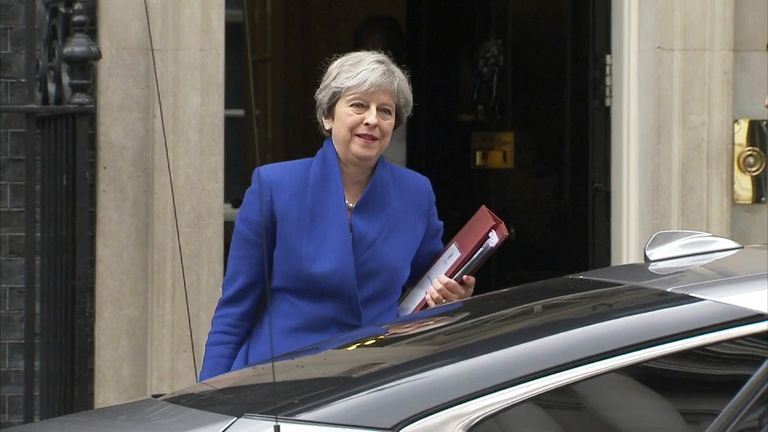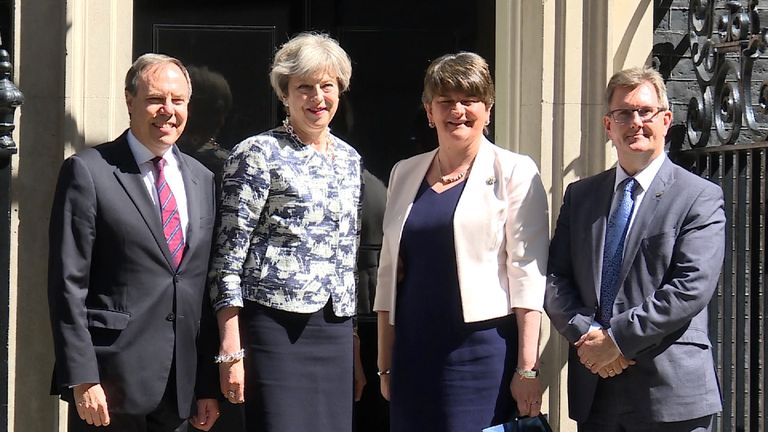Long read: First minority govt budget in decades

Tuesday 21 November 2017 18:45, UK
By Faisal Islam, Political Editor
The most important Budget number will not actually be contained within the pages of the Red Book.
It is 7. The number of MPs from the Conservative benches that it would take to defeat any budget legislation.
It is the number that towers above the growth projection, the employment numbers, and of course the deficit - the traditional focus of Treasury arithmetic.
This is in fact the first minority government budget in 39 years since Denis Healey presented his final budget in April 1978. John Major's government did not actually present a budget after his majority was lost.
The political diaries of Downing Street aides in the Callaghan era give a flavour of the constraints of minority government budgets, fearful of being tripped up by the Liberal Party as it was about to break its pact supporting Labour.
But 1978 was also designed to be a pre-election budget, a giveaway of £2.5bn in tax cuts after the IMF crisis austerity: "I do not in this budget make any call for sacrifice," Healey said, perhaps a nod to the fact that this was the first live budget speech broadcast. Mr Healey's conversion to tax cuts was only "knee deep" replied then Opposition leader Margaret Thatcher.
Four decades on, the Chancellor, or at the very least Number 10, might well have liked to use this budget to draw a line under austerity politics. The macroeconomic backdrop is not that of 1978, but the fraught sense of Britain in an international crisis, with unstable domestic politics is most certainly there. Phillip Hammond is most certainly under pressure to alleviate the many years of "sacrifice" following real-terms pay cuts for millions of public sector workers.
Already there can be none of the traditional Chancellorial economic gloats - we are no longer the fastest growing economy in the G7, but the slowest, and now similarly the slowest major EU economy, at the bottom of the 2017 league table with Denmark and Ireland, growing by half that of the Eurozone. There will be praise for the high levels of employment and low unemployment, but even that may have just peaked, and it is tinged with the reality of squeezed real incomes.
In another world, with a different election result, Theresa May could have used this moment to change direction, embracing a stronger role for the state, and the end of the austerity narrative. But the Government does not have the political space to take fiscal risks. If it needed to raise taxes to plug a deficit gap quickly, where would it get the votes from?
But in actual fact there has already been three pre-announced giveaways, including funding the £1bn for the confidence and supply deal. The tuition fees repayment freeze announced at Tory conference will cost £2.3bn a year in the long run says the IFS, and then there is the £600m a year National Insurance U-turn from the Chancellor's first budget in March.
It is worth dwelling on that last reverse for a moment. Every single Conservative budget since the 2015 election has seen a massive u-turn on one of the top two revenue raisers announced. Tax credits, Personal Independence Payments, and self-employed national insurance contributions.
It is now habitual. There is almost an expectation in this budget that there will be a mistake or something worthy of the u-turn. These days, the famous red book has the quality of a consultation document. And yet all of these instances were actually for a Government that had its own majority. Now the Government does not even have that.
So there is at least an economic constraint on giveaways, and a political constraint on takeaways. A fiscally neutral stasis would be in fact a good outcome. Actually there is now an economic impetus for a takeaway budget, and a political one for a giveaway.
The Office for Budget Responsibility has decreed at this point that Britain's low productivity performance should downgrade future expectations of growth and of tax, wiping out the Chancellor's built in cautious cushion. And yet the message at this point from the electorate and backbenchers is to ease up on major line items such as the public sector pay freeze, and universal credit implementation. In addition Jeremy Hunt has asked for many billions more, including enlisting Simon Stevens in a public plea, for cash to alleviate another winter crisis. Schools cuts too were identified at the election as a key driver of lost seats to Labour.
This would be quite the bind for an established Chancellor in a commanding position within Parliament, his Cabinet and his Party. Phillip Hammond is at the moment trying to get to that point.
So how to square the circle?
Borrow more? That might have been possible, but the OBR forecasts may have used up that room for manoeuvre. In addition the Brexit backdrop has already led to further downgrades of the UK sovereign credit rating. And the naturally cautious Mr Hammond will want to leave fiscal space to cope with the not implausible prospect of a "no deal Brexit".
The Treasury may have to focus interventions that have no immediate fiscal impact or even no need for immediate troublesome Parliamentary votes. George Osborne came up with the Living Wage in similar circumstances.
There is the possibility of freezing income tax threshold once high inflation gets it to the manifesto promise of £12,500 and the higher rate threshold to £50,000. That raises a few billion in later years according to the Resolution Foundation.
Then on Housing, there is planning reform. A classic supply side, neglected reform, that requires no cash, and has long been identified by everybody as the key break on housebuilding. And yet the Whips have pushed back on unhappiness from Tory MPs about any change that might impact green belt development. The Treasury clearly believes it is necessary. It costs nothing. It will boost housebuilding. It is pro-market. But it will not get past enough Tory MPs. Could the Chancellor stake his reputation on such a reform being past on Opposition votes? RiAG百家乐在线官网.
And yet can the Conservatives afford not to do anything to reboot its appeal among the under 40s, squeezed by housing inflation, falling real pay, unenthusiastic for the Government's take on Brexit?
Stamp Duty could be shaved back for some first time buyers, there is talk of a type of tax cut for younger workers. There will be high tech "Industrial Strategy" investments in Artificial Intelligence, driverless cars by 2021, £400m for electric car charge points, a fund for 5G mobile phone networks.
And talking of Brexit, this will be a set of OBR projections like no other. These are fiscal projections that will have to try to discount the probability of something increasingly likely - "no Brexit deal". This at a time when key industries - finance, pharma, automotive are now very vocal about the imminent activation of contingency plans given the sluggish progress of talks.
In truth this budget's decisions and ideas will pale in insignificance compared to the decisions made on transition and final resting place for a UK-EU relationship. Indeed Monday's Cabinet subcommittee on approving advances in the UK offer on the financial settlement could well be far more consequential than Wednesday's full meeting presenting the budget.
The Chancellor may well be regretting his decision to shift the Red Box moment to this week. He could have done without it. He and the Government have bigger priorities in the coming weeks. The Finance Bill legislative time alone is pushing the EU Withdrawal Bill's Commons stages into next year.
The first task of any Chancellor is fiscal credibility
It is hard to win and easy to lose.
Ordinarily that is about being tough and adhering to a set of pre-ordained rules restraining your borrowing. A task made for Spreadsheet Phil.
But these are far from ordinary times.
Political credibility is what matters. He needs a budget to pass intact without the sort of errors that have plagued the previous three, and with fewer Tory MPs.
That means a cautious minimalist budget taking few risks. And yet for that he personally risks being criticised for not having a buccaneering bold transformative vision and domestic reform agenda.
Politics is dramatic enough. The Government could not stomach a budget crisis. Again.
This was, of course, meant to be very different moment, but the electorate intervened.
The more fundamental question is this: Can a Government without a majority show a domestic vision? We may get an answer on Wednesday.
This is a Chancellor we already know has been lacking in fiscal firepower. The question is how much political firepower there is at HM Treasury.








